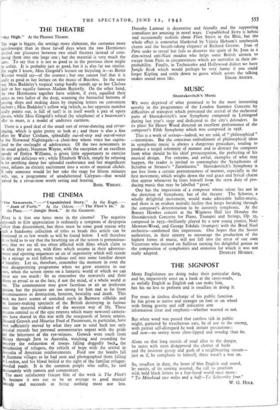MUSIC Shostakovitch's Music WE were deprived of what promised to
be the most interesting novelty in the programmes of the London Summer Concerts by difficulties of transport which prevented the arrival of the orchestral parts of Shostakovitch's new Symphony composed in Leningrad during last year's siege and dedicated to the city's defenders. In its place Sir Henry Wood directed an excellent performance of the composer's Fifth Symphony which was composed in 1938.
This is a work of serious—indeed, we are told, of " philosophical " —intentions. But the conscious embodiment of philosophical ideas in symphonic music is always a dangerous procedure, tending to produce a turgid solemnity of manner and to distract the composer from what should be his chief preoccupation, the perfecting of his musical design. For extreme, and awful, examples of what may happen, the reader is invited to contemplate the Symphonies of Scriabin or Strauss's " Zarathustra." Shostakovitch's Symphony is not free from a certain portentousness of manner, especially in the first movement, which weighs down the real grace and lyrical charm that appear whenever he frees himself from the stern duty of pro- ducing music that may be labelled " great."
One has the impression of a composer whose talent lies not in the direction of Symphony, but of the theatre. The Scherzo, a wholly delightful movement, would make admirable ballet-music, and there is an evident melodic facility that keeps breaking through the composer's determination to be austerely symphonic. At the Boosey Hawkes concert at the Wigmore Hall last Monday the Shostakovitch Concerto for Piano, Trumpet and Strings, Op. 35, • composed in 1933—brilliantly played by a new young pianist, Noel Mewton-Wood, and George Eskdale (trumpet) with the Boyd Ned orchestra—confirmed this impression. One hopes that the Soviet authorities, in their anxiety to encourage the production of the highest forms of music, will not fall into the error of our own Victorians who insisted on Sullivan turning his delightful genius to the composition of symphonies and oratorios for which it was not


























 Previous page
Previous page